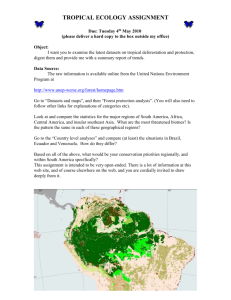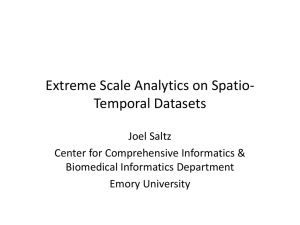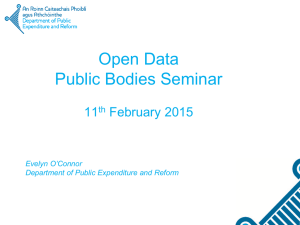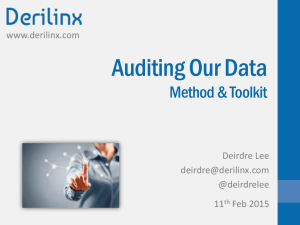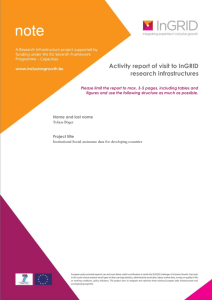draft paper for discussion Feb 12 (2)
advertisement
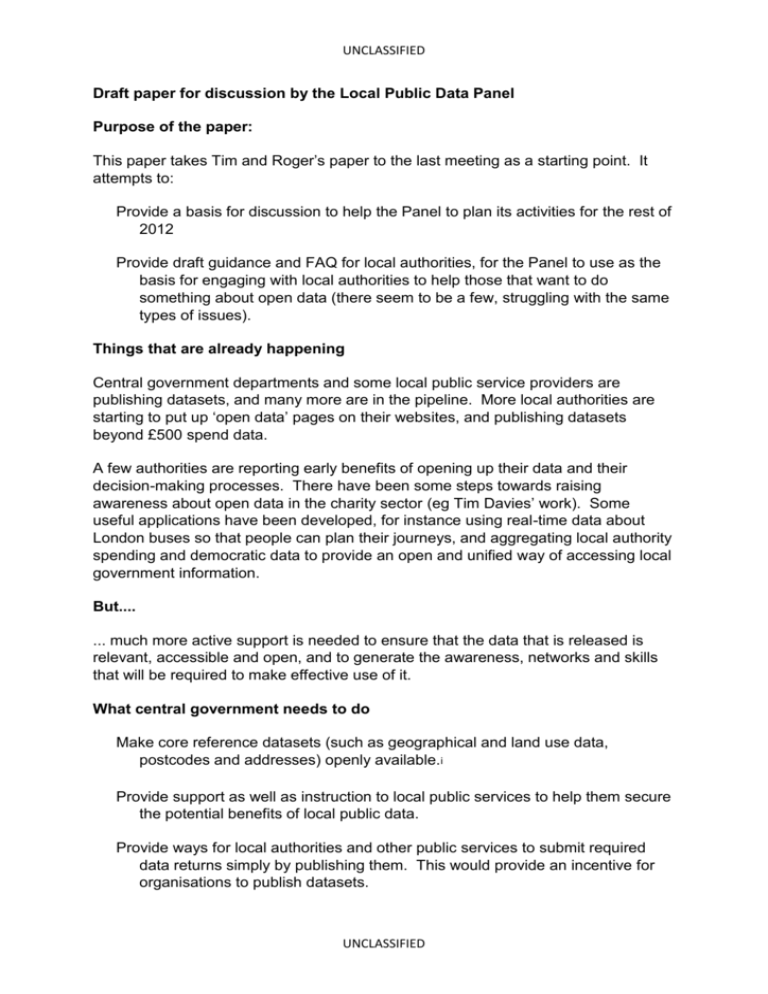
UNCLASSIFIED Draft paper for discussion by the Local Public Data Panel Purpose of the paper: This paper takes Tim and Roger’s paper to the last meeting as a starting point. It attempts to: Provide a basis for discussion to help the Panel to plan its activities for the rest of 2012 Provide draft guidance and FAQ for local authorities, for the Panel to use as the basis for engaging with local authorities to help those that want to do something about open data (there seem to be a few, struggling with the same types of issues). Things that are already happening Central government departments and some local public service providers are publishing datasets, and many more are in the pipeline. More local authorities are starting to put up ‘open data’ pages on their websites, and publishing datasets beyond £500 spend data. A few authorities are reporting early benefits of opening up their data and their decision-making processes. There have been some steps towards raising awareness about open data in the charity sector (eg Tim Davies’ work). Some useful applications have been developed, for instance using real-time data about London buses so that people can plan their journeys, and aggregating local authority spending and democratic data to provide an open and unified way of accessing local government information. But.... ... much more active support is needed to ensure that the data that is released is relevant, accessible and open, and to generate the awareness, networks and skills that will be required to make effective use of it. What central government needs to do Make core reference datasets (such as geographical and land use data, postcodes and addresses) openly available.i Provide support as well as instruction to local public services to help them secure the potential benefits of local public data. Provide ways for local authorities and other public services to submit required data returns simply by publishing them. This would provide an incentive for organisations to publish datasets. UNCLASSIFIED UNCLASSIFIED Ensure that FOI and open data policies apply to all public services (ie those that are publicly funded).ii Publish datasets held by quangos that are being abolished.iii Establish a benchmark of how many local authorities are currently doing what is suggested in the FAQ, so that we can measure progress (CLG). And??? [Panel members, insert your additional proposals here....] What local public services can do: Publish more open data. Engage with people inside and outside public service organisations to help them identify relevant datasets and make effective use of them. Support the development of skills and networks inside and outside their organizations to enable people to use local public data to solve problems and improve local areas. What the Local Public Data Panel can do: Definition: Generate an accepted definition of ‘local public data’, because it isn’t exactly the same as open data in general and there’s a need for a definition that goes beyond the technicalities of open data. Support for local authorities: Help local authorities to work through the process of opening up their data, eg by developing and publishing a guide and frequently asked questions (see Annex). Seek wider input for the document and then distribute it widely through our networks. Support for people to find and make effective use of local public data: Devise (and find money to support?) a proposal for CLG / LGA / Local authorities / other (?) to support local training and support for people to raise awareness of the data that is available and support skills and network development to enable people to use it.iv (Would there be any merit in the panel / CLG / Cabinet Office supporting open data surgeries, along the lines of the Podnosh social media surgeries? And if so is there anything we can do to get the ball rolling?) CLG data returns: Help CLG develop a way of gathering data returns that are published by local authorities, rather than receiving them through a closed system? Showcase the benefits: Gather and showcase (through the Panel’s blog?) examples of people using local public data to solve problems, bring about UNCLASSIFIED UNCLASSIFIED improvements and make local public services more efficient, effective and responsive. Generate / analyse demand for datasets: LGA (Or CLG?) to run a ‘request a dataset’ service, which local authorities could use to help prioritise datasets to release, and which we / CLG / cabinet office / whoever could use to help develop standard formats for those datasets. Press for release of more core reference data: Continue to apply pressure for appropriate governance arrangements around the release of core reference datasets (through our statements, general lobbying and meetings with relevant people). And ??? UNCLASSIFIED UNCLASSIFIED Annex: Draft guidance / FAQ for local authorities and other public services on local public data The benefits of local public data The effective release and use of local public data can: Enable people, including those who provide and those who use local public services, to understand and tackle issues in their area. Support participatory democratic processes like developing neighbourhood plans, making investment, planning and policy decisions. Level the playing field between local communities, public service providers and other people and organisations who make and influence decisions about their areas. Increase the productivity and efficiency of local public services (for example local authorities’ use of geographical information, and the savings the London Borough of Redbridge has achieved during the first five years of its Redbridge i project to digitise its services, including the release of local public data). Enable people to hold their local public services to account for their decisions and performance. Provide the raw material for applications that can help people make more informed decisions and make more effective use of services in their area. Publishing data in itself will not be sufficient to bring about all these benefits. Nor will publishing only limited sets of very narrow datasets without any context (such as data about payments over £500). Local public data needs to be seen as part of a wider set of changes in how participatory democracy works in a world where increasing numbers of people have access to the internet through computers, phones and other devices. The spread of internet access, and the ability of the web to serve as a platform (‘web 2.0) facilitate a general move to digital government by default. These changes also place pressure on public service organisations to open up their processes to make decisions and deliver services more collaboratively and transparently. UNCLASSIFIED UNCLASSIFIED Definition of local public data We define local public data as being: Accessible: Easy to find online. Presented in formats that are straightforward for a person with basic spreadsheet skills to view and manipulate. Locally relevant and usable: Relevant to the local area, issues in the area that people care about, and decisions that are being taken by local authorities and other public services. Sufficiently detailed to enable people to make sense out of it and use it to understand, solve problems and make decisions about their local area. This means datasets about buildings, streets, and neighbourhoods, not just local authority areas. It also means that data needs to be linked, where possible, to relevant location-based and other descriptive data. Technically open:v Structured and machine readable – ie in a spreadsheet or other structured format, rather than a pdf. Freely available under an open license.vi Where possible, linked to other data, especially descriptive data such as location data. UNCLASSIFIED UNCLASSIFIED Frequently asked questions about local public data (for local authorities / other local public services) How do the costs and benefits of releasing local public data weigh up? Static datasets are straightforward and not expensive to release in a structured format and under an open license for any organisation that already has a website. Dynamic real-time datasets can be published at a relatively low cost, if publication is built in to ongoing renewal of systems and contracts (eg Transport for London’s approach). The benefits of local public data are as long as a piece of string. The London Borough of Redbridge has reported savings of £2.7 million over five years, and recurring savings per annum of £1.1 million from 2012 arising from its Redbridge i project. Overall, the economic and social returns on investment for open data won’t be known until there is more of it and it is more widely and effectively used. Charging for local public datasets that are produced in the normal course of business is, in most cases, unlikely to be workable or beneficial in terms of the potential outcomes of publishing data. Which datasets should we prioritise? Financial and performance data should be published openly as a matter of course. This should be straightforward for any organisation with a website, since the data is already collated internally and in many cases is reported to external bodies such as CIPFA and central government departments. (For more detailed guidance on publishing spend data, see [insert link to LGA / data panel guidance]) Publish information that is requested under FOI. Doing this should be straightforward, as the information has to be collated anyway so publishing it should be a relatively minor additional task. There are also, particularly for frequently requested datasets, benefits in not having to collate the information again if a duplicate request is received. Provide links to datasets held by other organisations that are relevant to the area. This can help to get around early anxieties about the risks of publishing data, whilst making relevant local public data more readily available to local people inside and outside the organisation. Choose an issue the organisation and / or community organisations are currently working on, and work out what datasets the organisation has that could be openly published to support that process. UNCLASSIFIED UNCLASSIFIED Publish a list of datasets held by the organisation and ask people to identify priority datasets for release. Talk to local media, businesses, civic organisations, developers, schools, colleges and community activists and ask them what datasets they want. Where and how should we publish the data? There is no need to develop an expensive platform to release local public data. It can be released through the organisation’s existing website. Register the dataset with data.gov.uk [insert link to the how-to guide on data.gov.uk]. This will make it easy to find, and will enable people to use tools on or linked to data.gov.uk such as the postcode and map-based data search facilities. What format should we publish the data in? If you have the dataset in a structured format such as a spreadsheet, then use that format to publish it, and do so using the standard open government licensevii. Ideally, it should also be published in a non-proprietary structured format such as csv (see the five stars of open dataviii). Where possible, use existing standard formats such as central government or CIPFA returns. This will help people to make sense of the dataset by comparing it with other similar datasets. Eventually, doing this will also enable central government to collect datasets from local authority websites rather than requiring authorities to submit them separately. [ends] i Link to Panel statement on the Public Data Corporation Link to Panel submission to the Justice Select Committee on FOI iii Link to Panel statement on quangos iv Link to Tim Davies’ blog on a charter for data engagement v Link to TBL 5-star progression vi Link to OGL vii Link to TBL 5-star progression viii Link to OGL ii UNCLASSIFIED
